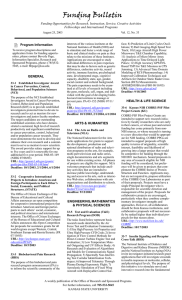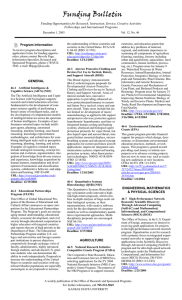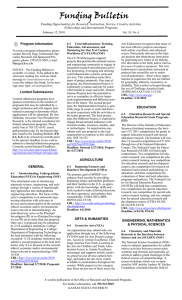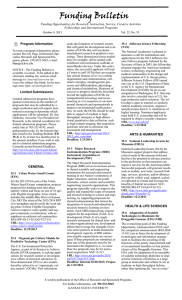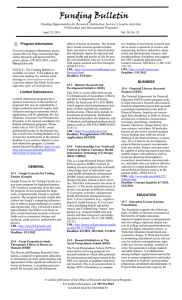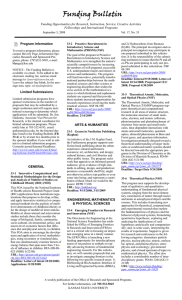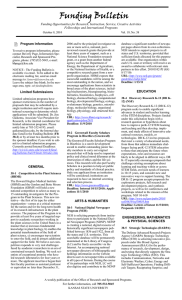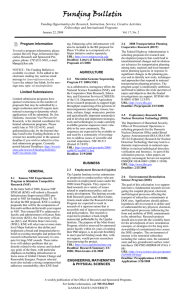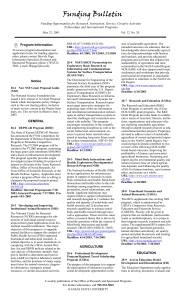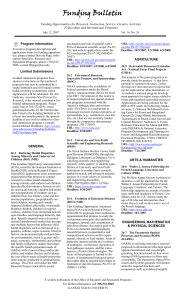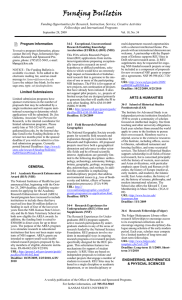Funding Opportunities for Research, Instruction, Service, Creative Activities
advertisement
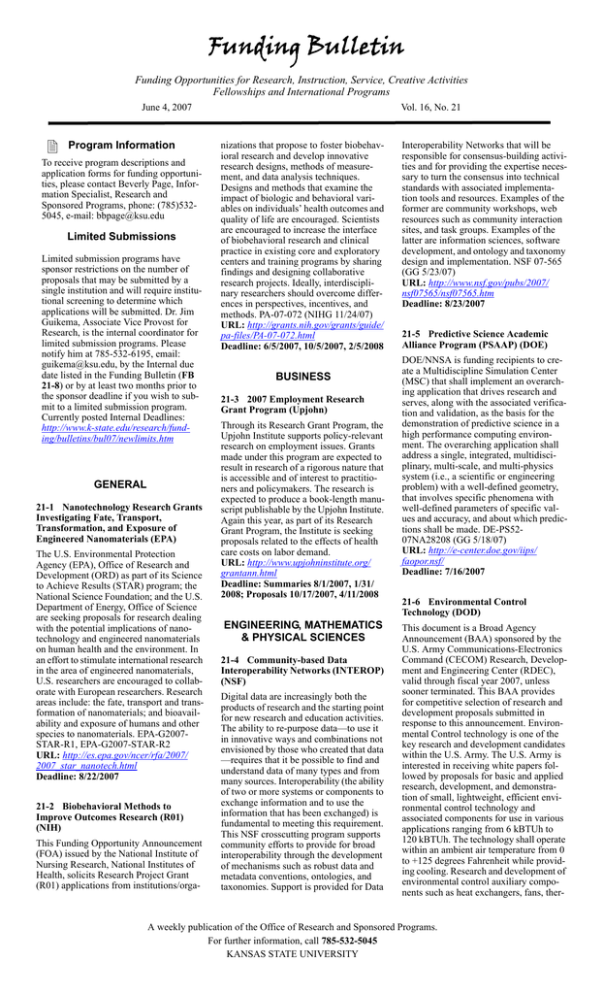
Funding Bulletin Funding Opportunities for Research, Instruction, Service, Creative Activities Fellowships and International Programs June 4, 2007 Program Information To receive program descriptions and application forms for funding opportunities, please contact Beverly Page, Information Specialist, Research and Sponsored Programs, phone: (785)5325045, e-mail: bbpage@ksu.edu Limited Submissions Limited submission programs have sponsor restrictions on the number of proposals that may be submitted by a single institution and will require institutional screening to determine which applications will be submitted. Dr. Jim Guikema, Associate Vice Provost for Research, is the internal coordinator for limited submission programs. Please notify him at 785-532-6195, email: guikema@ksu.edu, by the Internal due date listed in the Funding Bulletin (FB 21-8) or by at least two months prior to the sponsor deadline if you wish to submit to a limited submission program. Currently posted Internal Deadlines: http://www.k-state.edu/research/funding/bulletins/bul07/newlimits.htm GENERAL 21-1 Nanotechnology Research Grants Investigating Fate, Transport, Transformation, and Exposure of Engineered Nanomaterials (EPA) The U.S. Environmental Protection Agency (EPA), Office of Research and Development (ORD) as part of its Science to Achieve Results (STAR) program; the National Science Foundation; and the U.S. Department of Energy, Office of Science are seeking proposals for research dealing with the potential implications of nanotechnology and engineered nanomaterials on human health and the environment. In an effort to stimulate international research in the area of engineered nanomaterials, U.S. researchers are encouraged to collaborate with European researchers. Research areas include: the fate, transport and transformation of nanomaterials; and bioavailability and exposure of humans and other species to nanomaterials. EPA-G2007STAR-R1, EPA-G2007-STAR-R2 URL: http://es.epa.gov/ncer/rfa/2007/ 2007_star_nanotech.html Deadline: 8/22/2007 21-2 Biobehavioral Methods to Improve Outcomes Research (R01) (NIH) This Funding Opportunity Announcement (FOA) issued by the National Institute of Nursing Research, National Institutes of Health, solicits Research Project Grant (R01) applications from institutions/orga- Vol. 16, No. 21 nizations that propose to foster biobehavioral research and develop innovative research designs, methods of measurement, and data analysis techniques. Designs and methods that examine the impact of biologic and behavioral variables on individuals’ health outcomes and quality of life are encouraged. Scientists are encouraged to increase the interface of biobehavioral research and clinical practice in existing core and exploratory centers and training programs by sharing findings and designing collaborative research projects. Ideally, interdisciplinary researchers should overcome differences in perspectives, incentives, and methods. PA-07-072 (NIHG 11/24/07) URL: http://grants.nih.gov/grants/guide/ pa-files/PA-07-072.html Deadline: 6/5/2007, 10/5/2007, 2/5/2008 BUSINESS 21-3 2007 Employment Research Grant Program (Upjohn) Through its Research Grant Program, the Upjohn Institute supports policy-relevant research on employment issues. Grants made under this program are expected to result in research of a rigorous nature that is accessible and of interest to practitioners and policymakers. The research is expected to produce a book-length manuscript publishable by the Upjohn Institute. Again this year, as part of its Research Grant Program, the Institute is seeking proposals related to the effects of health care costs on labor demand. URL: http://www.upjohninstitute.org/ grantann.html Deadline: Summaries 8/1/2007, 1/31/ 2008; Proposals 10/17/2007, 4/11/2008 ENGINEERING, MATHEMATICS & PHYSICAL SCIENCES 21-4 Community-based Data Interoperability Networks (INTEROP) (NSF) Digital data are increasingly both the products of research and the starting point for new research and education activities. The ability to re-purpose data—to use it in innovative ways and combinations not envisioned by those who created that data —requires that it be possible to find and understand data of many types and from many sources. Interoperability (the ability of two or more systems or components to exchange information and to use the information that has been exchanged) is fundamental to meeting this requirement. This NSF crosscutting program supports community efforts to provide for broad interoperability through the development of mechanisms such as robust data and metadata conventions, ontologies, and taxonomies. Support is provided for Data Interoperability Networks that will be responsible for consensus-building activities and for providing the expertise necessary to turn the consensus into technical standards with associated implementation tools and resources. Examples of the former are community workshops, web resources such as community interaction sites, and task groups. Examples of the latter are information sciences, software development, and ontology and taxonomy design and implementation. NSF 07-565 (GG 5/23/07) URL: http://www.nsf.gov/pubs/2007/ nsf07565/nsf07565.htm Deadline: 8/23/2007 21-5 Predictive Science Academic Alliance Program (PSAAP) (DOE) DOE/NNSA is funding recipients to create a Multidiscipline Simulation Center (MSC) that shall implement an overarching application that drives research and serves, along with the associated verification and validation, as the basis for the demonstration of predictive science in a high performance computing environment. The overarching application shall address a single, integrated, multidisciplinary, multi-scale, and multi-physics system (i.e., a scientific or engineering problem) with a well-defined geometry, that involves specific phenomena with well-defined parameters of specific values and accuracy, and about which predictions shall be made. DE-PS5207NA28208 (GG 5/18/07) URL: http://e-center.doe.gov/iips/ faopor.nsf/ Deadline: 7/16/2007 21-6 Environmental Control Technology (DOD) This document is a Broad Agency Announcement (BAA) sponsored by the U.S. Army Communications-Electronics Command (CECOM) Research, Development and Engineering Center (RDEC), valid through fiscal year 2007, unless sooner terminated. This BAA provides for competitive selection of research and development proposals submitted in response to this announcement. Environmental Control technology is one of the key research and development candidates within the U.S. Army. The U.S. Army is interested in receiving white papers followed by proposals for basic and applied research, development, and demonstration of small, lightweight, efficient environmental control technology and associated components for use in various applications ranging from 6 kBTUh to 120 kBTUh. The technology shall operate within an ambient air temperature from 0 to +125 degrees Fahrenheit while providing cooling. Research and development of environmental control auxiliary components such as heat exchangers, fans, ther- A weekly publication of the Office of Research and Sponsored Programs. For further information, call 785-532-5045 KANSAS STATE UNIVERSITY mal expansion valves, electronic controls and other technologies that are associated with environmental control technology are also acceptable as a separate item or as part of a larger research and development proposal.W909MY-04-R-0025 (FBO 5/10/07) URL: http://www.fbo.gov/spg/USA/ USAMC/DAAB15/ W909MY%2D04%2DR%2D0025/ SynopsisP.html Deadline: 7/28/2008 HEALTH & LIFE SCIENCES 21-7 Outcomes in Children with Mild to Severe Hearing Loss (R01) (NIH) This Funding Opportunity Announcement (FOA) issued by the National Institute on Deafness and Other Communication Disorders (NIDCD) and the Agency for Healthcare Research and Quality (AHRQ) solicits longitudinal research applications from institutions/organizations to investigate outcomes in young children with mild to severe hearing loss. Applications must be multidisciplinary and have a primary focus on determining the impact of intervention, child, and family factors on communicative, educational and social development outcomes in young children with mild to severe hearing loss. RFA-DC-08-001 (NIHG 5/11/ 07) URL: http://grants.nih.gov/grants/guide/ rfa-files/RFA-DC-08-001.html Deadline: Letters of Intent 8/4/2007; Applications 9/4/2007 21-8 Beckman Young Investigators (BYI) Program (BF) The Arnold and Mabel Beckman Foundation makes grants to nonprofit research institutions to promote research in chemistry and the life sciences, broadly interpreted, and particularly to foster the invention of methods, instruments, and materials that will open up new avenues of research in science. The Beckman Young Investigator (BYI) Program is intended to provide research support to the most promising young faculty members in the early stages of academic careers in the chemical and life sciences. To be eligible, an applicant should not have completed more than three full years in his or her tenure-track or other comparable independent research appointment. No more that two candidates may apply from any one institution. URL: http://fundingopps.cos.com/cgibin/getRec?id=2793 Deadline: Internal 7/28/2007; Proposals 9/28/2007 21-9 Insulin Signaling and Receptor Cross-Talk (R01) (NIH) The National Institute of Diabetes and Digestive and Kidney Diseases (NIDDK) and the National Institute on Aging (NIA), National Institutes of Health (NH), invite investigator-initiated research grant applications that will investigate crosstalk in insulin responses at molecular, cellular, and physiological levels. The purpose of this Funding Opportunity Announcement (FOA) is to stimulate novel and innovative research into the fundamental mechanism(s) of action of the insulin receptor in target issues in the context of other cellular receptors and signaling pathways, and to broaden our understanding of how insulin signals act to regulate coordinated responses between and among insulin responsive tissues. PA-07-058 (NIHG 11/ 24/06) URL: http://grants.nih.gov/grants/guide/ pa-files/PA-07-058.html Deadline: 6/5/2007, 10/5/2007, 2/5/2008 INTERNATIONAL/MULTICULTURAL 21-10 New Directions in Institutional Support for Japanese Studies (JF) To encourage the sustained and innovative growth of Japanese Studies in national as well as transnational contexts, the Japan Foundation is significantly expanding its Institutional Support Program in the United States. Individual grants of up to $150,000 will be made in fiscal 2008-09 to colleges, universities (or consortia of colleges and universities), and academic organizations that formulate convincing proposals for growth and demonstrate backing for those proposals through matching funds. Proposals should address the needs, opportunities, and visions of particular institutions and need not conform to the funding categories that previously comprised the Japan Foundation’s Institutional Support Program. URL: http://www.jfny.org Deadline: Preproposals 8/31/2007 under the Small Grant (R03) mechanism; PA-07-314, which solicits applications under the Exploratory/Development Grant (R21) mechanism; and PAR-07315, which solicits applications under the Exploratory Grants for Mental Health Interventions and Services (R34) mechanism. PA-07-312 (NIHG 1/19/07) URL: http://grants.nih.gov/grants/guide/ pa-files/PA-07-312.html Deadline: 6/5/2007, 10/5/2007, 2/5/2008 21-12 Cultural Anthropology Scholars Awards (NSF) The National Science Foundation announces an opportunity for methodological training by cultural anthropologists who are active researchers. The purpose is to help cultural anthropologists upgrade their methodological skills by learning a specific analytical technique which will improve their research abilities. NSF 07-544 (Posted 1/23/07) URL: http://www.nsf.gov/pubs/2007/ nsf07544/nsf07544.htm Deadline: 8/16/2007, 8/16/2008 21-13 Basic and Translational Research in Emotion (R01) (NIH) The purpose of this Funding Opportunity Announcement (FOA) is to solicit grant applications to expand basic and translational research on the processes and mechanisms involved in the experience, expression, and regulation of emotion. PA-07-083 (NIHG 11/24/06) URL: http://grants.nih.gov/grants/guide/ pa-files/PA-07-083.html Deadline: 6/5/2007, 10/5/2007, 2/5/2008 SOCIAL SCIENCES 21-11 Mental Health Consequences of Violence and Trauma (R01) (NIH) The National Institute of Mental Health (NIMH) invites research grant applications for investigator-initiated research to enhance scientific understanding of the etiology of psychopathology related to violence and trauma, as well as studies to develop and test effective treatments, services, and prevention strategies in this area. Areas of particular interest to the NIMH include interdisciplinary approaches combining multiple levels of inquiry (e.g., psychological, neurobiological, genetic) and scientific tools (e.g., ecological assessment, neuroimaging, microarrays) for psychopathology risk modeling, identification of highly predictive markers of pathology, and improved diagnostics; translation of basic behavioral and neuroscience findings on resiliency and risk for the intervention development and testing; and strategies for effective service provision, particularly where non-specialty systems (i.e., primary care) may be required to provide mental health services. This FOA will use the NIH Research Project Grant (R01) award mechanism, and runs in parallel with FOAs of similar scientific scope, PA-07-313, which solicits applications R.W. Trewyn, Vice Provost for Research & Dean of the Graduate School Jim Guikema, Associate Vice Provost, Graduate Research Caron Boyce, Administrative Specialist Preaward Section Paul Lowe, Director Anita Fahrny, Assistant Director Kathy Tilley, Rich Doan, Carmen Garcia, Candice Foster, Danielle Brunner, Rex Goff, Dawn Caldwell, Sharon Zoeller Information Specialist & Editor Beverly Page Human Subjects, Animal Care & Use, and Biosafety Gerald P. Jaax, Research Compliance Officer Ashley Rhodes, Compliance Liaison Adassa Roe, Administrative Specialist Congressional Relations Sue Peterson, R.W. Trewyn A weekly publication of the Office of Research and Sponsored Programs. For further information, call 785-532-5045 KANSAS STATE UNIVERSITY

